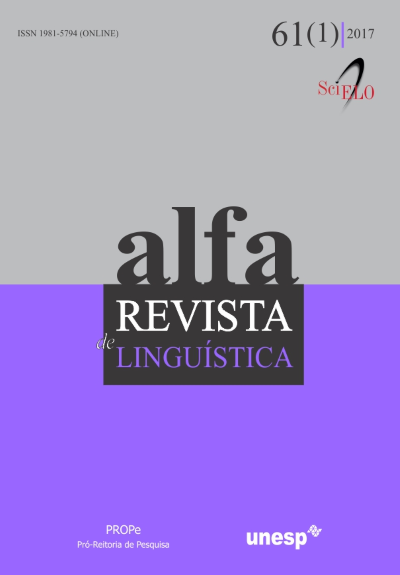The minimal word in European Portuguese: the oralization of abbreviated forms
DOI:
https://doi.org/10.1590/1981-5794-1704-6Keywords:
Minimality Condition, Syllable Weight, Word, Wordiness Constraints, Well-formedness,Abstract
The phonological constraints that define which phonetic chains are elegible to become a word in a given language generally include a Minimality Condition (MC). MC imposes a minimum of phonological substance that must be included by any single word of the language. Traditionally, CM is measured in terms of syllable weight or syllabic extension of the word. It has been much debated whether MC corresponds to a truly universal constraint; as for Portuguese, previous studies have been conflicting between the acceptance and the refusal of its operationality in the phonology of the language. In this study, we will assess the functionality of MC for the building of Portuguese lexical entries by means of observing the oralization of abbreviations. This is assumed here as a word-productive process in Portuguese. Based upon an experimental study with a group of native speakers of Contemporary European Portuguese (CEP), we conclude (i) that MC is an operative constraint in the phonology of Portuguese, and (ii) that its defining criterion is purely linear and segmental. According to our proposal, MC is respected in CEP when a phonetic chain contains a minimum of three segments, regardless of syllable weight and syllabic extension.Downloads
Download data is not yet available.
Downloads
Published
02/05/2017
How to Cite
VELOSO, J. The minimal word in European Portuguese: the oralization of abbreviated forms. ALFA: Revista de Linguística, São Paulo, v. 61, n. 1, 2017. DOI: 10.1590/1981-5794-1704-6. Disponível em: https://periodicos.fclar.unesp.br/alfa/article/view/7982. Acesso em: 9 jan. 2026.
Issue
Section
Papers
License
Manuscripts accepted for publication and published are property of Alfa: Revista de Linguística. It is forbidden the full or partial submission of the manuscript to any other journal. Authors are solely responsible for the article's content. Translation into another language without written permission from the Editor advised by the Editorial Board is prohibited.

